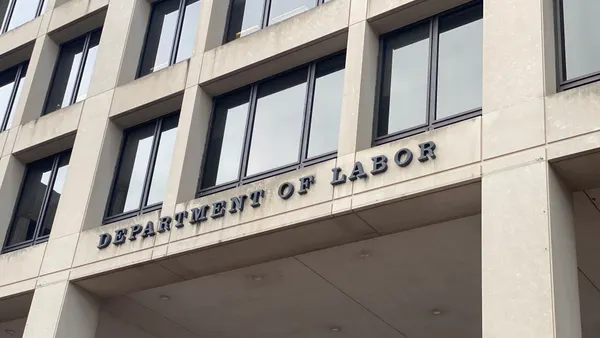Dive Brief:
- The D.C. Circuit Court of Appeals heard arguments in the NLRB's Browning-Ferris joint employer case Thursday. According to the Competitive Enterprise Institute, the court was confounded by the NLRB’s joint employer definition, which it considered vague and conflicting.
- Under the NLRB’s definition, a company can be held jointly liable for a labor violation if it has “indirect control” or “possesses unexercised potential control” over the wages, hiring and supervision of a contracting entity’s employees.
- The appeals court said the definition of “indirect control” was vague, and it questioned whether the joint employer rule applies when, for example, a company tells a contractor it’s dissatisfied with the job the contractor’s workers are doing, or whether the company is merely “expressing economic influence” to get the job properly completed.
Dive Insight:
Without clarifying the joint employer rule, the NLRB has left employers and the court confused about what constitutes compliance. To stay within the law, employers need rules that specify when boundaries are crossed. Otherwise, more companies could needlessly be at risk for liability and the fees and penalties that come with it.
The NLRB’s 1984 joint employer rule provided a bit more clarity by stating that a company created a joint employer relationship with a contracting entity if it had “direct control” over the entity’s employment terms and conditions.
Employers could now have collective bargaining responsibilities under the latest rule. The court asked whether a company considered to be a joint employer would also be liable in the union affairs of contracted workers. The NLRB has been and remains a strong protector of unionization and workers’ rights to organize.
The NLRB’s stand could turn on its head, once the Trump administration’s pro-business nominees for labor secretary and Supreme Court justice are confirmed. Alexander Acosta, a former NLRB member, replaces the president's first labor secretary nominee, Andrew Puzder, who withdrew his name from consideration. Judge Neil Gorsuch, Trump’s SCOTUS nominee, sees the court as a body that simply determines whether the law has been violated and whether intentional discrimination occurred.
As expected, Republican lawmakers have set out to fix the joint-employer rule. Sen. Lamar Alexander (R-TN) has already introduced the Protecting Business Opportunity Act, which reverts the ruling back to its original stand.











